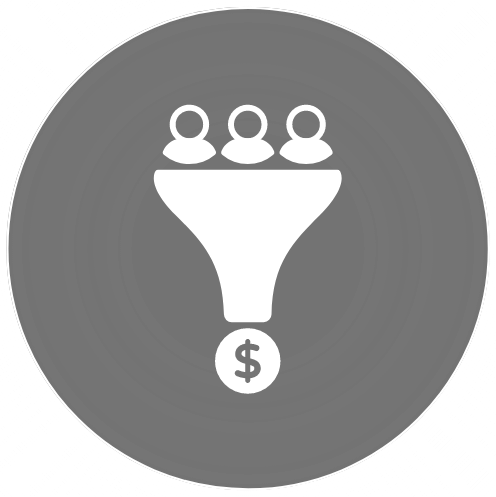In this post:
What Is Search Marketing and Why Should You Care?
Search marketing refers to getting your website, social media pages, or other web pages to rank well with search engines like Google and Bing via paid and unpaid methods.
Try saying that five times fast! If it seems like a mouthful, that’s because it kind of is.
Ranking well with search engines is essential to getting your web pages noticed by potential customers. Even the best-written pages will be ineffective if they languish on page six, ten, or 100 (the horror!) of search results.
According to Forbes, as many as 92 percent of web users look no further than the first page of search results. With around 1.2 billion websites active today, the competition for those top spots is fierce.

The best search marketing efforts combine both paid and unpaid methods of increasing search engine ranking. Organic (unpaid) growth can be more cost-effective, but it usually takes longer to realize even small movements in ranking using unpaid methods. The good news is that once you've gained ground using organic growth, the results tend to stay awhile.
Conversely, the effects of paid advertising on search engine results (and website traffic!) are more immediate but vanish immediately when you end your paid campaign.
Search marketing is a big space in the digital advertising world, so buckle up as we dive right in.
What Is Search Engine Optimization (SEO)?
Search Engine Optimization, usually referred to simply as SEO, is the art and science of making your web pages rank highly with search engines using organic methods (aka unpaid traffic).
Entire books have been written about what makes up good SEO techniques. In a nutshell, it involves creating content that is useful and beneficial to your readers and letting the search engines easily detect what your pages are about. The algorithms know best, in this case.
There are three types of SEO: on-page SEO, technical SEO, and off-page SEO.
On-page SEO, as the name implies, involves what you write on your web and social media pages. Good on-page SEO technique includes publishing good, interesting, and useful content, using a few, carefully chosen keyword phrases to let search engines know what your page is about. A popular planning strategy for good on-page SEO is using the topic cluster model of content development.
You’ll want to make sure you’re using those keywords and phrases in the right places on the page (e.g. in the first paragraph, in at least one "H2" heading, in the page title, in your image caption) so the Google machine doesn’t get confused. (The Google machine is very particular.)
Of these on-page elements, having good content is by far the most important. Google, in particular, seeks out websites with what it deems to be good content. Google uses a sophisticated machine-learning algorithm to evaluate content.
While the exact algorithm is a well-kept secret, it's safe to say that it works by matching your content to that of a known authority in your field (like a university site or a non-profit). It also looks at how long readers stay on your pages, using the theory that good content encourages readers to stay longer to read it. It looks at things like images—which might be optional for an opinion site—but necessary for a food, gardening, or craft site.
Without good content, none of the rest of the information and tips on this page are likely to make any difference in your page ranking.
Technical SEO is the "page-office" stuff. This includes crafting a good META title and META description, making sure that you site loads quickly, having the necessary security measure in place, making your site adaptable to a variety of screen sizes and mobile-friendly, and organizing your website logically.
Off-page SEO has to do with your relationships with other well-regarded websites. Who is linking to your site? Are they sites that increase your image of authority in the eyes of search engines...or are they cheapening your brand? A good way to get good backlinks is to offer to write a guest post for websites that complement your site. (Oh by the way, have you read this blog post from Sellerly about us? ← See what we did there?)
👍 SEO in action: This client engaged us for SEO help and reached #1 on Google!
What Is Search Engine Marketing (SEM)?
Search Engine Marketing (SEM) is using paid advertising to help your web pages show up on search results pages. We like to call this a rent-to-own approach to marketing. Basically, you’re taking up prime space with paid ads until you can reach that same prime space without paid ads.
By using Google AdWords (or the similar Microsoft Advertising platform through Bing), you can bid for and purchase keywords and phrases that best represent your business. If your business focuses on local traffic, you can add the city, with a keyword like "Atlanta hair salons" or "Boston pet food stores".
When someone searches for something similar to your keyword or phrase, your ad will be in the running for ones that they'll see at the top of the page (without having to scroll down...this is key). If someone clicks through to your website from one of those ads, Google (or Bing) will charge your account. Your ad will stop running when you've hit your agreed-upon monthly maximum marketing budget.
So...why should you pay for a good search engine ranking when you can (at least theoretically) get the same results for free, using good SEO practices? Using paid search advertising helps put your listing at the "front of the line" and increases the likelihood that you'll show up at the top of Google (at least in the short run), outsmarting your competitors who are using exclusively organic methods.
However, it's wise to keep in mind that there is a subset of consumers who bypass the paid ads in search results on general principle. By using paid search methods exclusively, you'd miss out on that segment of the web buying public.
👍 SEM in action: This client employed PPC ads to drastically increase product sales.
SEO vs. SEM: Which Method Is Best?
SEO vs. SEM, paid vs. unpaid...which one is better?
The answer is that it depends.
It depends on your industry, your goals for your digital marketing, your budget, and how much time you have to devote to your SEO or SEM efforts. It's our view that everything "depends" in marketing.
SEO is best for those companies that have more time than money. If you have a lot of time to devote to crafting stellar content, approaching other websites about guest posts and writing them, and manually updating your pages and links so that everything is constantly fresh, then SEO will save you money and, done well, will yield long-lasting results.
SEM helps to speed up the process and yields results even if you have limited time to devote to search marketing. If it is done well, SEM can get your site placed above the organic sites. SEM is also a good choice for a promotion that has specific parameters, such as Red Lobster's "Lobster Fest" month. The downside to SEM is that when you stop paying for ads, your visibility (and traffic) will decrease abruptly.
Our opinion is that the best digital marketing plan uses a combination of SEO and SEM.
Both SEO and SEM will help your web pages stay visible to consumers and drive a more targeted base of readers to your web pages. SEM can get you instant web traffic while you build your content and the depth of your site enough to attract readers organically.
Back to the "rent-to-own" approach...When you combine SEO and SEM you're getting the best of both worls. You pay first for results, and you end up "owning" your good ranking by virtue of your well-built, well-organized website and its stellar content.
To learn more about how to increase your search engine ranking using SEO and SEM techniques, book a call with one of our growth experts!


-AK-148968-preview.png?width=842&height=310&name=1.01-1x1px-Embertribe-(Client-Services)-AK-148968-preview.png)









.png?width=810&height=810&name=TJ%20Jones%20-%20%20CoFounder%20EmberTribe%20(1).png)


%20-%20500x500%20-%20SP%20-%2045.01.png)
%20-%20500x500%20-%20SP%20-%2049.01.png)
%20-%20500x500%20-%20SP%20-%2057.01.png)


.png)